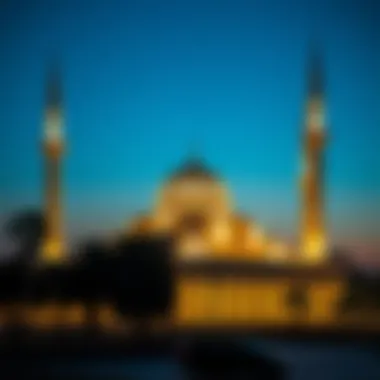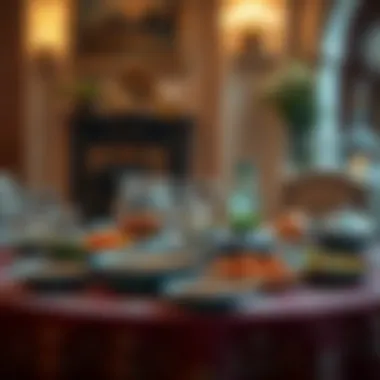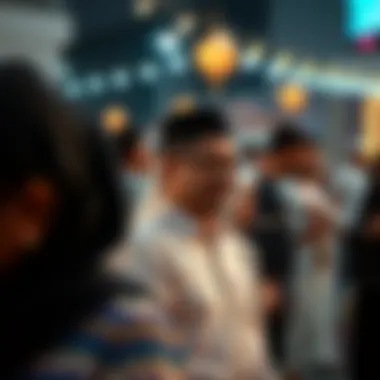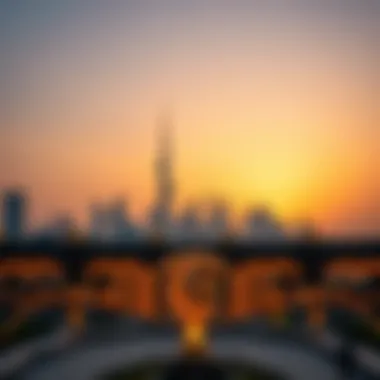Ramadan Timings in Dubai: A 2023 Overview


Intro
Ramadan is a holy month that holds profound significance for Muslims around the world. In 2023, Dubai emerged as a focal point for Ramadan celebrations, blending deep-rooted traditions with modern practices. As the sun sets and the call to prayer echoes across the skyline, the city comes alive with a unique energy that captivates residents and visitors alike.
In this extensive examination, we will not only outline the timings for prayer and fasting during Ramadan 2023 in Dubai but also delve into the deeper cultural and community dynamics at play. Understanding these timings is paramount, as they directly influence daily routines, business operations, and the real estate landscape within the city.
By contextualizing the significance of these timings within the broader socio-cultural framework, this article aims to serve as a valuable resource for investors, buyers, agents, and developers. We will navigate through various aspects surrounding Ramadan in Dubai, ranging from the market trends to investment opportunities that arise during this month.
As we embark on this exploration, you can expect to find a rich tapestry of insights, all tied together by the essence of community engagement and cultural reverence that Ramadan inspires in the bustling metropolis of Dubai.
Preface to Ramadan in Dubai
Ramadan holds a prominent position in Dubai, not merely as a month of fasting, but as a rich tapestry of traditions and community bonding. In a city that boasts a blend of modernity and ancient heritage, the observance of Ramadan encapsulates a spiritual journey while reflecting cultural values. This section seeks to illuminate how Ramadan influences various layers of daily life, economy, and personal interactions. Understanding this can provide valuable insight for anyone looking to navigate the nuances of Dubai during this special month.
Understanding Ramadan
Ramadan, the ninth month of the Islamic lunar calendar, is observed by Muslims around the world as a period of fasting, prayer, reflection, and community. During this month, from dawn until sunset, believers abstain from food and drink to focus on spiritual growth and community ties. It’s a time for purifying the soul, re-evaluating one’s life and, most importantly, connecting more deeply with one’s faith and community.
The fast is broken daily at sunset with a meal called iftar, often shared with family and friends. The pre-dawn meal, known as suhoor, is equally significant, setting the tone for the day ahead. This tradition fosters not only personal discipline but also community gatherings, bringing families and friends together in shared experiences.
Historical Context of Ramadan in Dubai
The historical significance of Ramadan in Dubai is as rich as the landscapes of the city. Historically, the UAE has been a melting pot of cultures and religions, leading to a unique interpretation of Ramadan. In the early days, long before Dubai evolved into a bustling metropolis, the observance of Ramadan centered around community and familial bonds.
Historically, fasting during Ramadan was not always confined to abstaining from food. It also encompassed a broader spectrum of behavioral conduct including fostering goodwill, mercy, and community support. As trade flourished, especially during the pearling era, merchants would often host iftar gatherings to enhance community ties with local residents, irrespective of their backgrounds.
Within the context of modern Dubai, Ramadan has transformed into a blend of respect for tradition whilst embracing a globalized culture. Today, as the city showcases impressive skyscrapers and bustling economic activity, the essence of Ramadan remains deeply ingrained in the hearts of its people. While the city expands rapidly, the observance of this month continues to bring a sense of unity amidst the fast-paced lifestyle.
"Ramadan is not just a month of fasting; it’s a time where hearts connect, traditions are upheld, and community grows stronger."
In both these sections, we have laid the groundwork for comprehending the importance of Ramadan in Dubai. The focus on cultural significance and historical context underscores the depth of this observance, particularly for investors and individuals seeking to engage meaningfully with the local populace during this period.
Significance of Ramadan Timings
The significance of Ramadan timings extends beyond the act of fasting in Dubai; it binds the community together and reflects the deep-rooted traditions observed over centuries. Understanding these timings is vital for both spiritual connection and practical engagement in the bustling life of the city.
The Importance of Fasting
Fasting during Ramadan is not merely a physical act; it represents a rich tapestry of spiritual discipline and reflection. For many, the pre-dawn meal, known as Suhoor, is a moment of preparation, a time to nourish the body and mind before the sun rises. This meal often fosters a sense of community as families come together to share in this significant ritual.
As the sun sets, breaking the fast, or Iftar, transforms into a communal event where families and friends gather to enjoy a meal. The ritual of fasting serves as a reminder of empathy for the less fortunate, fostering compassion and gratitude among those who partake.
Moreover, fasting encourages self-discipline. It is a month that challenges individuals to refrain from not just food and drink but also negative behaviors and distractions. In this light, fasting acts as a transformative journey, compelling individuals to rediscover their faith and personal resolve.
Connection Between Timing and Faith


The connection between specific timings and faith is profound. In Islam, both fasting and prayer are spiritually rewarding, and their intertwined nature during Ramadan strengthens communal bonds. The prayers, known as Salah, coincide closely with the fasting schedule, enhancing the spiritual experience of observing this holy month.
Muslims are encouraged to take a moment at the very break of dawn and at sunset to connect with their faith. The call to prayer, or Adhan, marks these pivotal moments, reminding believers of their spiritual commitment. Thus, adhering to these timings isn't simply about following rules; it's a way of expressing devotion.
"Timings during Ramadan, particularly for fasting and prayer, create a rhythm that connects daily life with spirituality, embodying both discipline and community."
Proper awareness of these periods empowers individuals to plan their daily activities around them, enhancing both personal and business interactions. For businesses, recognizing Ramadan timings is crucial, as many adjust their operating hours to align with the faith of their customers and employees. It conveys respect and fosters goodwill.
In essence, the significance of Ramadan timings in Dubai encapsulates a blend of spiritual, cultural, and practical dimensions. Investors and developers must consider these elements, as they shape not only social dynamics but also influence economic decisions during this period.
Fasting Timings in Dubai for Ramadan
Fasting holds a profound significance in the lives of Muslims and carries a multitude of benefits that extend beyond the physical act itself. In Dubai, the observance of fasting during Ramadan is not just a religious duty, but an intricate part of the cultural fabric that shapes the rhythm of daily life. Understanding the fasting timings is paramount as it influences everything from personal schedules to social engagements, making it a crucial topic for residents and investors alike.
Suhoor and Iftar Timing Overview
During Ramadan, two key events punctuate the day: Suhoor and Iftar. Suhoor is the pre-dawn meal that fuels individuals for the day ahead, while Iftar is the meal that breaks the fast at sunset. In 2023, these timings are defined according to the local sunrise and sunset times, which change throughout the month.
For instance, the Suhoor is recommended to be completed by approximately 4:30 AM, ensuring that individuals have sufficient time to prepare for the fasting day. On the other hand, Iftar is traditionally marked with the call to prayer, which occurs around 6:50 PM, although exact times may shift slightly based on the lunar calendar.
To make it easier to plan, here’s a general overview of these timings for Dubai in Ramadan 2023:
- Suhoor Ends: 4:30 AM
- Iftar Begins: 6:50 PM
In addition to their importance for individual health and spiritual well-being, the timings of Suhoor and Iftar foster a deep sense of community. Families and friends gather to share meals, often in public iftar events, promoting unity and support among the community.
Detailed Daily Schedule
As the sun rises and sets throughout Ramadan, the daily schedule for individuals observing the fast can vary significantly. Here’s how a typical day might unfold in Dubai:
- 4:00 AM: Wake up for Suhoor, often a nourishing meal to help sustain energy levels.
- 4:30 AM: Suhoor ends, and preparation for the fasting day begins.
- Day Hours: Engaging in regular activities, albeit often at a more leisurely pace. Businesses may adjust their hours, as many employees start later to accommodate the fasting.
- 6:30 PM: People start gathering for Iftar, readying their surroundings and mentally preparing for the meal. This creates an atmosphere filled with anticipation and camaraderie.
- 6:50 PM: Iftar, the moment of breaking the fast, is typically marked by dates and water, followed by bigger meals that can include traditional dishes such as Biryani, Kebabs, and an array of desserts.
- Post-Iftar, many Muslims gather for Salah, or prayer, further emphasizing the spiritual focus of the day.
Understanding this daily rhythm helps not just individuals practicing fasting, but also businesses and investors prepare for changes in operational dynamics during the holy month. Adapting to these schedules ensures that they can engage effectively with clients and communities during Ramadan.
Through mastering the knowledge of these timings, stakeholders can better navigate the unique cultural landscape that characterizes Dubai during this sacred period.
Prayer Timings During Ramadan
In Dubai, where the multidimensional aspects of life intertwine with a profound spiritual framework, prayer timings during Ramadan play an essential role. While fasting during this holy month is a visible manifestation of faith, the five daily Salah offers a rhythmic cadence that shapes the daily life of Muslims. From the break of dawn until the last glimmer of daylight, prayer times are not just about adhering to duties; they're about building community spirit and enhancing personal spiritual growth.
Importance of Salah During Ramadan
Ramadan is more than just abstaining from food and drink; it’s about spiritual reflection and deepening one's connection to God. Salah, or prayer, is the core of this connection. Unlike any other time of the year, the observance of Salah during Ramadan takes on an amplified significance. It is believed that during this month, the spiritual rewards for prayer are exponentially increased.
Muslims are encouraged to engage in Taraweeh prayers, which are optional but highly encouraged evening prayers that occur after the obligatory Isha prayer. This not only fosters a stronger bond within the community but also provides an opportunity to complete the recitation of the Quran, which is traditionally done during this month.
Moreover, the collective experience of praying at mosques enhances a sense of belonging among participants. It's common to find mosques bustling with people, and the atmosphere is filled with an energy that uplifts one's spirit. The camaraderie felt during these prayers tightly binds communities together, making each session a cherished event.
Adjustments in Prayer Times


With the onset of Ramadan, minor adjustments to prayer timings occur in Dubai. These shift according to the lunar calendar and are crucial for ensuring that faithful observances transpire effectively.
- Fajr, the dawn prayer, calls Muslims to begin Suhoor, the pre-dawn meal. The timing shifts slightly each day, underscoring the lunar month’s nature.
- Before Maghrib, the sunset prayer, individuals often prepare for iftar, when the fast is broken. This crucial moment combines the increase in social gatherings with the deeper spiritual experience.
- Isha prayer is delayed, allowing for Taraweeh prayers afterward, which can stretch late into the night and often become a community highlight.
Factors such as geographical location and local mosque traditions can influence these prayer timings. However, during Ramadan, many mosques display their schedules prominently or offer apps whereby individuals can stay informed.
Noteworthy Insight: The Islamic Affairs and Charity Departments can provide accurate prayer schedules during Ramadan, ensuring that there’s no confusion among worshippers.
Cultural Celebrations During Ramadan
Cultural celebrations during Ramadan are integral to the collective experience within Dubai, bringing communities together in a spirit of unity and reflection. As the sun sets and the call to Maghrib prayer pierces through the evening air, the resonance of communal gatherings echoes across the city. These celebrations go beyond mere social engagement; they embody the core values of generosity, hospitality, and shared spirituality that define the holy month.
Community Iftars and Gatherings
One of the hallmark features of Ramadan in Dubai is the tradition of Iftar, the meal that breaks the daily fast. Throughout the month, communities make it a point to come together for communal Iftars, where neighbors, friends, and families share delicious meals. Local entities, mosques, and even businesses often host these gatherings. For instance, hotels like the Burj Al Arab and local mosques organize Iftar events that can cater to hundreds, incorporating diverse cuisines reflective of Dubai's multicultural makeup.
The benefits of these gatherings are manifold. Firstly, they foster a sense of belonging, especially for expatriates who may feel distant from their home cultures. Secondly, Iftars serve as a means to reinforce social bonds and community ties, knitting the social fabric tighter; as the saying goes, “many hands make light work.”
- Inclusiveness: Community Iftars are open to all, bridging cultural and religious divides. People from various backgrounds may partake in these meals, offering a chance to experience different traditions.
- Traditional Recipes: These gatherings often highlight traditional dishes, encouraging the sharing of family recipes passed down through generations.
“Iftar is more than just a meal; it’s a manifestation of one’s connection to family, faith, and community.”
However, there are considerations one must keep in mind, particularly regarding dietary restrictions or food allergies. Always having a conversation around the table about what’s served can ensure that all feel included. This attention to detail represents the essence of hospitality that is so cherished during Ramadan.
Cultural Events and Activities
Beyond Iftar, the month of Ramadan in Dubai brims with cultural activities designed to engage residents and visitors alike. Art exhibitions, charity events, and cultural performances pop up around the city, offering opportunities for enrichment through knowledge and engagement.
For example, the Dubai Opera hosts special performances that align with Ramadan themes, providing a platform for artists to express their interpretations of faith and community. Similarly, various cultural centers in the city put together workshops and talks around Islamic history and arts. These activities are often free or at a minimal cost, thereby promoting accessibility.
The benefits extend to both residents and tourists, who can immerse themselves in the city’s rich cultural tapestry. Engaging with these events enables a deeper understanding of Islamic traditions and the significance of Ramadan:
- Exhibitions: Art displays showcasing local artists can inspire conversations about personal and collective experiences concerning faith, identity, and belonging.
- Traditional Music and Dance: Performances that include traditional music and dance offer a sensory exploration of Arab culture, enhancing the festive atmosphere.
Such cultural events allow individuals to gain insights into Ramadan, making it more than just an observance; it becomes an experience imbued with learning, growth, and forging connections.
As Ramadan continues to draw near for 2023, embracing these cultural celebrations will ultimately bring forth an enriched understanding of community, faith, and the spirit of togetherness that defines this transformative month in Dubai.
Business Operations in Dubai During Ramadan
Business operations in Dubai during Ramadan require a thoughtful examination, as the holy month brings about unique dynamics that can significantly affect both daily routines and financial transactions. Understanding these changes is crucial for investors, buyers, agents, and developers. In a bustling metropolis known for its rapid growth, knowing how Ramadan influences the marketplace allows stakeholders to strategize more effectively.
Adjustments in Business Hours
During Ramadan, you’ll notice a palpable shift in business hours across Dubai. Most companies adjust their working schedules to accommodate the fasting hours. Typically, the working day is shortened, with many businesses operating from around 9 am to 3 pm. This schedule alteration reflects the cultural respect for fasting individuals who break their fast with Iftar at night.


For instance, retail establishments might open later and close after iftar, extending their hours into the evening to cater to shoppers who prefer to visit post-sunset. The cafes and restaurants also tend to shift their hours, often serving Iftar meals in the evening rather than maintaining usual lunch menus during the day.
This temporary restructuring can be a double-edged sword for businesses; while adapting may involve some challenge, the potential for higher sales in the evening hours is a worthy incentive to keep in mind.
Key Considerations on Adjusted Hours
- Planning Meetings: It’s essential for businesses to reschedule meetings to late afternoons or evenings, as mornings might not see effective engagements due to a lower barrage of productivity.
- Client Relations: Foster relationships with clients by respecting their schedules and preferences during Ramadan. Engaging in Iftar events can go a long way in building rapport.
- Marketing Strategies: Utilize this unique time for targeted marketing efforts. Special Ramadan promotions can resonate with consumers who are in the spirit of giving and community.
Impact on Real Estate Transactions
The real estate market in Dubai does not remain untouched during Ramadan. While some might expect a slowdown due to fasting, the reality can often be far different. Transaction activity might either decrease or shift entirely to later hours, as potential buyers often prefer to visit properties after Iftar.
Many real estate developers and agencies adjust their open house events and viewings to align with potential buyers' schedules. The insights gained during this month can provide a clearer picture of buyer attitudes and intentions, especially as community gatherings tend to spark interest in property investments.
Factors Influencing Real Estate Activity
- Increased Buyer Interest: Many feel spiritually inclined to invest during Ramadan. It’s seen as an auspicious time, sometimes leading to more serious inquiries.
- Community Networking: Ramadan events often serve as excellent networking opportunities. Gathering for Iftar can bring together like-minded investors and agents, paving the way for potential deals.
- Long-term Investments: With the quiet of fasting hours, developers might use this time to reassess long-term projects. The reflection during Ramadan can lead to enhanced strategies for upcoming developments.
Overall, Ramadan offers a unique lens through which one can understand consumer behavior—be it a slower pace of life or a surge in community-oriented investments. Understanding these elements can position investors and businesses harmoniously with the rhythm of the month.
Thus, navigating the landscape of business operations during Ramadan not only promotes respect and understanding but can also yield valuable opportunities for growth and engagement with the local community.
For more insights on how traditional customs influence business practices, you may visit Encyclopedia Britannica or Reddit.
Challenges and Considerations
Health and Well-being During Fasting
Fasting during Ramadan stretches beond mere abstention from food and drink; it encapsulates a holistic approach to health and well-being. The month serves as an opportunity for spiritual growth as well as a time to focus on one's physical health. As the sun rises and those pre-dawn meals, known as Suhoor, are consumed, it’s essential to optimize food and drink choices. Nutrient-rich foods like oats, dates, fruits, and lean proteins can help maintain energy levels throughout the day. Similarly, adequate hydraation during non-fasting hours ensures that individuals avoid dehydration, which, in hot climates like Dubai, can be a serious consideration.
Moreover, mental health is just as crucial. A significant change in routine can lead to stress or anxiety. Engaging in daily prayers and community gatherings can enhance a person's sense of belonging and emotional stability. It’s worth noting that while fasting might pose challenges, it also opens avenues for self-discipline and resilience. By establishing a balanced approach, individuals can safeguard their health and well-being while experiencing the spiritual essence of Ramadan.
Culmination and Insights for Real Estate Investors
In considering the dynamics of Dubai during Ramadan, it becomes clear that the holy month exerts a notable influence on various sectors, notably real estate. This concludes an extensive exploration of Ramadan timings, revealing how these spiritual observances intertwine with the lifestyle and economic patterns of the city. Stakeholders in the real estate market must pay attention to how these changes can affect both buyer behaviors and market conditions throughout this month.
Observations on Market Trends
During Ramadan, specific trends emerge that can significantly impact real estate investment decisions. Observers have noted a subtle shift in rental demands, as families gather for iftars, which can both spark interest in larger homes and affect short-term rental markets. Recent data indicates that the demand for rental properties aligned with community amenities tends to spike during this time. Investors would do well to consider properties near mosques or areas known for hosting community events, which are likely to attract families seeking congregational experiences.
- Rental Demand Increases: Rental prices may see a slight uptick due to higher demand for larger family accommodations.
- Community-Centric Living: Proximity to mosques and known gathering spots can affect desirability.
- Investment Strategy Shift: Focus might need to shift towards properties that support communal living.
These observations suggest that investors should tailor their portfolios to align with seasonal behaviors and cultural significance, which may lead to optimized rental yields.
Strategic Implications for Investors
Understanding the implications of Ramadan-related changes is crucial for strategic positioning in the market. Investors should absorb these insights to navigate the nuances of property investments during this period effectively.
Firstly, adjusting marketing strategies to reflect the cultural importance of Ramadan can resonate with potential buyers or renters. The emphasis on family and community can persuade an audience that values spaces fostering togetherness.
- Modify Listings: Highlight features that support family gatherings such as spacious kitchens or outdoor areas.
- Timing Promotions: Consider special Ramadan offers that align with local traditions.
- Engage in Community Events: Participate in or sponsor community-themed Iftars to bolster brand visibility within the community.
By recognizing these strategic alternatives and focusing on cultural integration, investors can position themselves more favorably within the competitive Dubai real estate market. Overall, understanding the intersection of Ramadan timings and real estate trends can potentially yield lucrative benefits for investors willing to adapt and engage authentically with the community.







